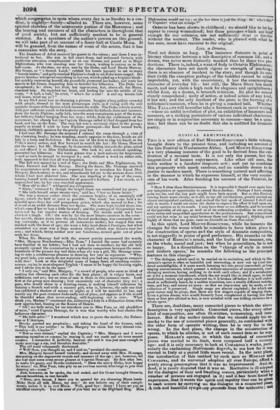MUSICAL REMINISCENCES.
Tins is a new edition of Earl MOUNT-EDOCUMBE'S little volume, brought down to the present time, and including an account of the late Festival in Westminster Abbey. Lord Mouree-EDGCumss is a very pleasing instance of the good to be derived from the cul- tivation of a musical taste. It is not only the purest, but the longest-lived of human enjoyments. Like other old men, the noble author is a laudatar temporis aeti ; and yet he combines- this propensity with much candour, and an amiable desire to do justice to modern merit. There is something natural and affecting in the manner in which he expresses himself, at the very conclu- sion of his work. After finishing his account of the Festival, he says- " Here I close these Reminiscences. It is impossible I should ever again have any temptation or opportunity to extend themfurther. Perhaps I have already gone too far, and the last part might have been spared. But as this Festival, coming home more closely, as it did, to my old recollections, greatly excited my almost extinguished curiosity, and revived the last spark of interest I shall ever take in music, I could not resist the desire to express the effect it had upon me, and my opinion as to its result. I may have done so too diffusely, and be accused of the-garrulity of old age, as well as of its unbending prejudices ill not giving more entire and unqualified approbation to the performances. But comparisons could not but arise in my mind between these and the original; thinking more highly of those that are gone, casts no discredit on those that exist."
In this spirit, Lord MOUNT-EDGCUMBE, while he laments the changes for the worse which he considers to have taken place in the construction of operas and the style of dramatic composition, is not niggardly in praise of good performers. His remarks on the character of Rossisn's music, and the faults of his manner, are5 on the whole, sound and just; but when he generalizes, he is not so happy. In a dissertation on the "change of style in music and modern operas," he remarks the following as the principal features in this change- " The dialogue, which used to be carried on in recitative, and which in Me- tastasio's operas is often so beahtiful and interesting, is now cut up (and ren- dered unintelligible, if it were worth listening to) into pezzi coneertati, or long, singing conversations, which present a tedious succession of unconnected, ever- changing motives, having nothing to do with each other; and if a satisfactory air is for a moment introduced, Which the ear would like to dwell upon, to hear modulated, varied, and again returned to, it is broken off before it is well under- stood or sufficiently heard, by a sudden transition, into a totally different melody, time, and key, and recurs no more : so that no impression can be made, or re- collection of it preserved. Single songs are almost exploded ; for which one good reason may be given, that there are few singers capable of singing them. Even a prima donna, who would formerly have complained at having less than three or four airs allotted to her, is now satisfied with one trifling cavatina for a whole opera." There are, doubtless, many concerted pieces to which the above description is very applicable. Concerted pieces, like every other kind of composition, are often ill-written, unmeaning, and inco- herent. But if the author intends that we should apply his re- marks to the use of concerted pieces generally, as contrasted with the older form of operatic writing, then he is very far in the wrong. In the first place, the change in the construction of operas, to which he alludes, is not of such recent date as he sup- poses. MOZART'S operas, in which the method of concerted pieces was carried to its limit, were composed half a century ago: and it is only necessary to look at CIMAROSA'S works, parte cularly the enchanting Matrimonio Segreta, to see how far it was carried in Italy at a period little more recent. In the next place, the introduction of this method by such men as MOZART and CIMAROSA, and its universal adoption all over Europe, afford pretty strong presumption that it was an improvement. And:in- deed, it is rarely disputed that it was so. Recitative is ill adapted for the dialogue of busy and hustling scenes, particularly when a number of persons are engaged in it; and it has been found by ex,perience, that it wants the spirit and rapidity that can he Ern to slush scenes Ity carrying eon the dialogue in a concerted piece. A rick and beautiful sympb on lawevds from the °rehear& ;alal




















 Previous page
Previous page